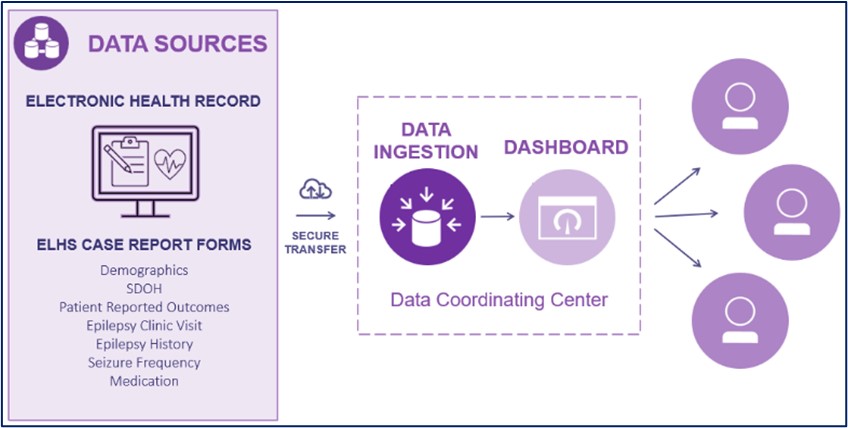The Epilepsy Learning Healthcare System (ELHS)
Mission & Methods

In 2018, the Epilepsy Foundation was awarded a PCORNet Learning Health System Network Pilot Collaborative grant to establish an Epilepsy Learning Healthcare System (ELHS). Founded on the practice of coproduction (where people with epilepsy and their families are equal partners with clinicians) and connecting pediatric and adult epilepsy centers with each other and with community service providers, ELHS empowers all people to live their highest quality of life, striving for freedom from seizures and side effects.
ELHS centers learn from every patient at every visit. Guided by the Model for Improvement and the Chronic Care Model, standardized data is gathered from ELHS clinics across the country, agnostic of electronic health record (EHR) type, into a registry curated by the Data Coordinating Center. Data is received, processed and analyzed centrally to identify best practices that will lead to better outcomes for patients and families. Quality Improvement (QI) methodology in a shared-learning model drives the work of ELHS. Participating centers receive tailored, comprehensive data reports which enable tracking of progress both at the individual-, site- and network levels.
"ELHS has been instrumental in working towards a more defined method of recording outcomes. - William Trescher, MD, Penn State Hershey Children’s Hospital"
Improvement areas include seizure frequency reduction via improved seizure documentation and screening for barriers to medication adherence, quality of life, screening for anxiety and depression, status epilepticus, transition of care, counseling on contraception and pregnancy & more.
Learn More
View our Abstracts & PublicationsELHS Quality Measures of seizure frequency and time-since-last-seizure were adopted by the American Academy of Neurology in 2022, and demographic data being collected in ELHS is already shedding light on previously unexplored disparities in epilepsy care and outcomes for communities including LGBTQ+.
Benefits for all
What sets ELHS apart from a typical registry, is the ability to enact change in real-time. Patient Reported Outcomes (PROs) are linked with clinical records, enabling insights to a complete picture of health and readiness for pre-visit planning – enhancing the partnership between people with epilepsy and their providers.
"ELHS reinforces both the importance of how patient education and patient-provider communication impact outcomes. -Shawna Benard, MD, University of Southern California Keck School of Medicine"
Return on investment for participating centers includes efficiencies in care delivery, use of methodology for divisional, departmental, and institutional quality measures, Maintenance of Certification credit, opportunities for career advancement and research, and the potential for demonstration of value with third-party payers.
"Through my involvement with ELHS, my understanding of Quality Improvement methodology has expanded exponentially, and this work has become an integral component of my clinical practice. -Jacob Pellinen, MD, University of Colorado Health"
Resources
Epilepsy Centers
Epilepsy centers provide you with a team of specialists to help you diagnose your epilepsy and explore treatment options.
Epilepsy Medication
Find in-depth information on anti-seizure medications so you know what to ask your doctor.
Epilepsy and Seizures 24/7 Helpline
Call our Epilepsy and Seizures 24/7 Helpline and talk with an epilepsy information specialist or submit a question online.
Tools & Resources
Get information, tips, and more to help you manage your epilepsy.





